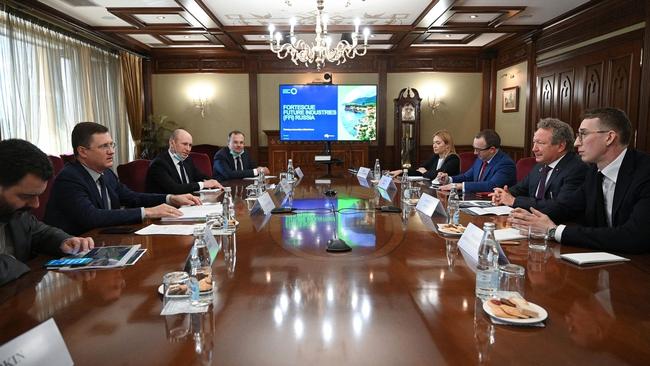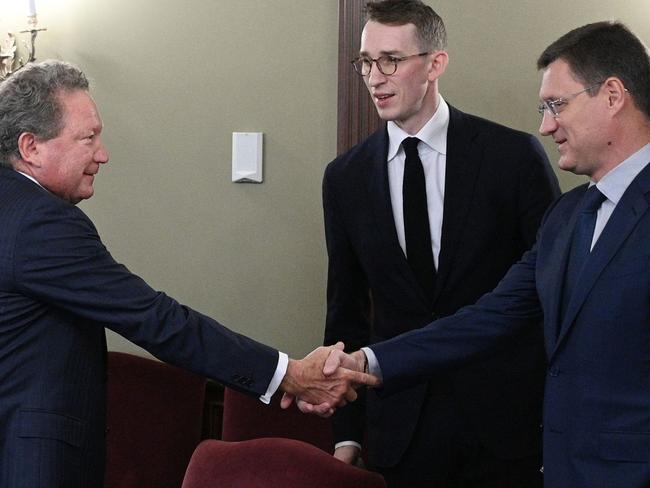
In the wake of Russia’s invasion of Ukraine, FFI said the company was “drawing back our work in Russia”. “We cannot tolerate one country invading another,” a spokeswoman said.
The question for Fortescue shareholders is whether the company should have been there in the first place. The last two years have seen fellow resources giants BHP and Rio Tinto – among others – become more interested in developing mines in Africa and other jurisdictions once seen as too risky for the biggest miners.
Russia remains one of the few countries on Rio’s global investment “Red List”, and sits in 136th position – out of 180 – in Transparency International’s corruption perception index.
But Russia is also one of the world’s oil and gas giants, and has until this week also been a target for FFI’s global green energy campaign, with the company hunting for potential renewable energy assets in the east of the country that could produce hydrogen for export.
Forrest spoke at the St Petersburg economic forum in June last year, and met Russian Industry and Trade Minister Denis Manturov at the conference.
At the time, Forrest was open about his interest in hydrogen projects in Russia, saying the company had been “warmly welcomed” in the country, and that Fortescue had a “highly professional team that remains on the ground in Russia”.
On the trip Forrest also met with Russia’s Deputy Prime Minister, Alexander Novak (also a director of Russian gas giant Gazprom), who said after the meeting that “the parties decided to set up a working group to discuss possible areas of co-operation in hydrogen energy”.

What is less well known is that Forrest also met Alisher Usmanov – a billionaire oligarch said to have close links to Vladimir Putin – who is believed to have helped broker FFI’s introduction to senior levels of the Russian government.
FFI also has a “regional manager, Russia and CIS regions” on its books, and is said to have been closely considering multiple projects in the country, including potential iron ore developments – although it has not disclosed any formal agreements with Russian authorities.
FFI did not respond to detailed questions from The Australian over whether it has previously met with any of the individuals, banks or companies subject to the latest round of sanctions.
Fortescue Metals also has an extensive exploration program in Kazakhstan, which in January invited in Russian troops to help quell riots in the country’s capital.
Fortescue is hardly alone in looking to do business in resource-rich Russia and its client states – BP and Shell are under fire for their involvement in the country’s oil and gas industry.
And there is no suggestion of any wrongdoing by Forrest or any of FFI’s staff members. But the company’s retreat from Moscow in the wake of the Ukraine invasion highlights the very real risks of the “billionaire diplomacy” on which the magnate has based FFI’s hydrogen dream.
FFI’s entire global push is largely based on the frenzied world tour undertaken by Forrest and senior executives in late 2020 and then again last year.
In addition to potential projects in more stable jurisdictions, FFI has been linked with agreements to consider projects in countries such as Kenya, Democratic Republic of Congo, Ethiopia, Papua New Guinea and Cameroon. All sit in the bottom third of Transparency International’s corruption index.
And unlike BHP, Rio, Glencore, Shell or BP – or any of the other resources majors – Fortescue has little longstanding presence in many of the developing countries in which it is seeking to build massive infrastructure projects. Despite all of the governance controls, good intentions – and knowing they faced the close scrutiny of NGOs such as Transparency International – almost all of those companies have run.
Russia has been edging towards war in Ukraine since the annexation of Crimea in 2014, and has since been accused of meddling in US elections – among other things. Why, then, would Fortescue consider doing business in Russia?
Although the actual amount spent will be insignificant in the context of Fortescue’s recent profits, any shareholder money spent investigating options in Russia has now been burned – a risk that should have been obvious before Forrest set foot in the country. If Fortescue was further down the path of developing projects in Russia, those costs might be far greater.
The same risks apply in many of the places FFI is seeking to do business. FFI is on a self-imposed deadline to find, develop and build assets capable of supplying 15 million tonnes of hydrogen a year by 2030 – an enormous task, under any circumstances. And yet its approach to transparency appears to be going backwards.
In December, Fortescue announced it had done a deal with the government of Gabon to study the development of the giant Belinga iron ore deposit in the country – a former BHP deposit that has been in the “too hard” basket for a decade.
Its 20 per cent partner in the project would be the Africa Transformation and Industrialisation Fund – but Fortescue has consistently refused to disclose who is behind the fund which, at the time of the announcement, had little or no public profile outside of the announcement.
In January, Fortescue CEO Elizabeth Gaines told The Australian the company had agreed to keep the identities of its partners confidential. But there’s little reason for the shroud of secrecy. ATIF is the vehicle of Indian-born businessman Gagan Gupta, until relatively recently the leader of the African operations of Singaporean agriculture giant Olam.
Gupta reportedly has a very close relationship to Gabon’s President, Ali Bongo. And his Arise group of companies controls a large suite of infrastructure assets in Gabon and neighbouring countries – including airports, ports and other infrastructure.
But, on the face of it, there are no obvious red flags associated with Gupta or any of his companies – no reason for Fortescue not to be proud of its association with a successful and well-connected businessman. So why the secrecy?
It is almost two years since Forrest and FFI launched their private jet into the air on their global hydrogen campaign.
Despite all the hype, Fortescue is yet to release a single document disclosing what agreements have been made, with whom they have been reached, or how much they might cost to build and operate.
Surely such a document exists.
Forrest’s Russian excursion suggests the risks the company is taking on through FFI could become very substantial for Fortescue shareholders.
It is about time the company and its chairman told shareholders exactly what they are.




That Andrew Forrest and Fortescue Future Industries are in quiet retreat from Moscow highlights one of the major risks facing Fortescue shareholders from his green hydrogen strategy.